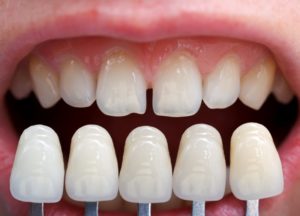 Let’s say you’re thinking of giving your smile a major boost. You walk into your dentist’s office and ask what cosmetic options are available. Your dentist then starts talking about porcelain veneers in Ware and how they would be a great option for your smile. You look back puzzled.
Let’s say you’re thinking of giving your smile a major boost. You walk into your dentist’s office and ask what cosmetic options are available. Your dentist then starts talking about porcelain veneers in Ware and how they would be a great option for your smile. You look back puzzled.
“Isn’t porcelain fragile?” You ask. Your dentist gets this question often, so she thought she would go into more detail on why she uses a seemingly “fragile” material for covering teeth.
Why Do We Think Porcelain is Fragile?
When people think of porcelain, they usually think of the fragile porcelain plates found in their parents’ or grandparents’ glass cabinets. The thought of walking near them was likely unthinkable as a child, but aside from being dropped from a few feet, even porcelain used in plates was quite sturdy. In fact, porcelain is considered the strongest and most durable dinnerware available. However, it’s important to note that porcelain’s use isn’t only limited to dinnerware.
Porcelain veneers are designed to last for many years and regular use, similar to dinnerware. While they’re not intended to withstand large amounts of direct force, such as a bad fall, it’s entirely useful for everyday use. Natural teeth certainly aren’t either, so when compared to porcelain veneers, you’re actually getting a very strong dental device.
Let’s go into a few example where we see porcelain used for sturdy applications.
Porcelain Is Used for Many Sturdy Products
Think about all the items and parts of your home that use ceramic or porcelain. One of the most common places you’ll find it is in your bathroom. The floors or walls are lined with porcelain not just for aesthetic appeal, but utility as well.
While you’re in the bathroom, you’ll likely notice that your toilet is made of solid porcelain. One of the main reasons manufacturers haven’t changed their use of porcelain in toilets is there are few materials as strong as porcelain that also perform all the necessary functions a toilet requires. It also does quite a good job at matching the rest of the bathroom. Another good example is ceramic knives. They’re able to withstand daily use for many years without any worry of breaking.
A Brief Breakdown of Materials Used in Veneers
Your dentist can say with confidence that porcelain veneers in Ware are just as strong, if not stronger, than natural teeth. Depending on where you go, veneers can be made up of different materials. Let’s go over a few of them now.
- Feldspathic porcelain – One of the first veneer substances ever used, this material was used by most dentists up until the mid-1990s. While many dentists prefer it’s aesthetic qualities, it’s often considered the weakest option today.
- Zirconium Dioxide – A byproduct of zirconium and oxygen, this material creates very strong restorations.
- Lithium Disilicate – A glass ceramic made up of several different substances, including quartz, alumina, and other components. This can be used to make very strong and life-like veneers.
Porcelain is much stronger than you think, which is why it’s become the standard for cosmetic dentistry. Learn more from your cosmetic dentist in Ware at your next scheduled appointment!
About the Author
Dr. Navkiran Dhillon earned her Bachelor of Dental Surgery degree in India before earning her DDS degree from Boston University four years later. To cover imperfections in your smile or learn more about her practice, contact her at (413) 967-7140 or visit her website.
